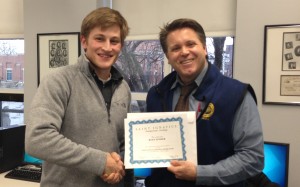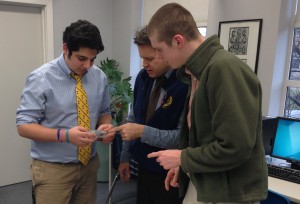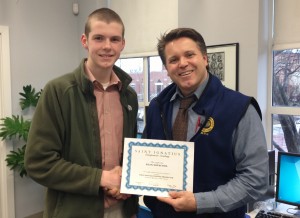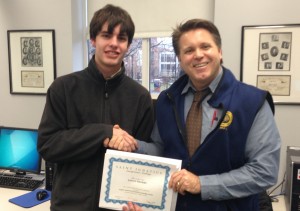by Daniel Ertle ’15
For six groups of aspiring entrepreneurs, the February 26 meeting of the Saint Ignatius Entrepreneurial Academy (SIEntA) was a monumental event in their careers as businessmen. It was at this meeting that six groups of students were awarded real money for their work in creating business plans that will lead to the creation of their own businesses. The club’s co-moderator Mr. Hess, known for his frankness, commenced the meeting addressing the club saying that he has “been walking on air, just so excited about the work [club members] did.” On the previous Sunday, the 24th of February, these six groups of entrepreneurs took part in Saint Ignatius’s very own edition of Shark Tank, as moderators Mr. Hess and Mr. Moy were joined by Mr. Joe Cassaro ‘03 to judge the business plans made by club members. All of the groups were awarded at least $50, but the club also awarded larger sums of money to more promising business plans.

In response to Saint Ignatius’ first ever Shark Tank, Mr. Hess said, “It’s exciting that a club at St. Ignatius can act as venture capitalists and see six promising business come into existence.” The first winner was sophomore Harrison Klee who pitched his invention that Mr. Hess described as a gadget that causes one to think to himself, “Wow, this doesn’t already exist?” The innovative sophomore created a product he calls “Topswell Backpack,” a waterproof backpack that also serves as a flotation device. Harrison is aiming this product at the up-and-coming paddleboarding industry, as well as the preexisting jet ski industry. Because of the difficulty of the patent process, the club decided it could not be of much service to Harrison and his backpack, so he was awarded the minimum prize of $50.
Also being awarded $50 were sophomores Sean Sovacool and Clark Gronek. Sovacool, a now-seasoned veteran in his field, pitched his system of micro-marketing, in which he hand-delivers rentable advertising to potential buyers’ doors. With prior success, the club believes Sovacool will experience even more success with more capital, and thus awarded Sovacool $50. Joining Sovacool and Klee with their sweet winnings was Clark Gronek, who pitched his idea of creating cookies with the logos of companies. The sharks believed Gronek created a great product, yet had their doubts of his potential success because of the competitive food industry packed with already-established companies.

Starting off the winning of larger sums was junior Ryan Linker, who pitched the startup of a car-detailing company with a low startup cost. Impressed by his passion and experience, the sharks decided they would help Linker in his pursuits by buying him a $250 steam cleaner, finalized with a handshake agreement that Linker would start the company over the summer. Other winners of the coveted $250 business-model award were sophomores Louis Thiery and Prithvi Pendekanti, who pitched the creation of the “North Coast Junior Forensics League” that will address the absence of a speech league for Northeastern Ohio middle school students. The eloquent sophomores plan to establish a program in which they will go to middle schools and establish debate teams that would compete in a tournament here at Saint Ignatius.
Finally, earning the most praise and money was junior Sami Petros, who has worked with a friend from Highland Heights High School to create a “compact and affordable alternative to traditional personal computing.” Petros calls this invention the “Fun Box, powered by Raspberry Pi” and received $500 from the club to help with startup costs. The “Fun Box, powered by Raspberry Pi” features an operating system similar to Apple TV with a word processor that creates a brand-new PC. Shockingly, Petros and his partner hope to sell this “alternative to personal computing” for only $100. In an interesting turn, Mr. Hess did his best impression of Mark Cuban, and announced that the club would be willing to add another $500 in return for a one-third stake in Petros’s company. Petros is unsure at the moment whether he will accept the deal, but will definitely consider the offer. The money from the club’s offer will come from the $2,000 that the SIEntA has grossed in their sale of bricks reclaimed from West 30th Street, which demonstrates SIEntA’s unique mission: making real money and then investing that money in real student businesses.








